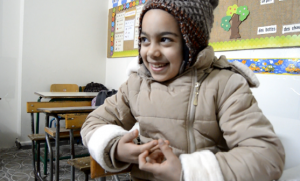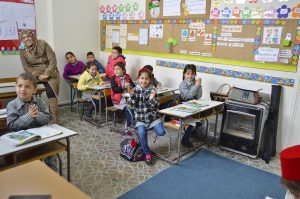-
What We Do
- WHERE WE WORK
-
About Us
 Welcome Message from Carol Jenkins
Welcome Message from Carol JenkinsFor more than 90 years, World Learning has equipped individuals and institutions to address the world’s most pressing problems. We believe that, working together with our partners, we can change this world for the better.
On my travels, I’ve had the opportunity to meet with many of those who have joined us in this mission. In Baghdad, we’ve trained more than 2,300 Iraqi youth who are already giving back at home. In London, our partners in the TAAP Initiative strongly believe that we are all responsible to practice inclusion. And in Vermont, our Experiment in International Living and School for International Training participants prove every day that they have the tools and the determination to change the world.
Please join us in our pursuit of a more peaceful and just world.
- Get Involved
Media Center > Story
The Storyteller of Nabatieh
June 1, 2017
Ghina is a second-grade student in Kfarsir Public School in Nabatieh, a city in southern Lebanon. She enjoys reading Arabic stories to her friends and classmates and playing the role of “Hakawati” — Arabic for Storyteller.
This wasn’t always the case, however.
Not too long ago, when asked what she liked most about her Arabic language class, Ghina responded, “The best part is when the teacher reads us a story!”
Now she is able to read these stories on her own.

Recently, her Arabic language teacher, Fatima Rteil, gave her a story from QITABI’s leveled classroom library and asked her to read aloud to classmates. That’s when she discovered her own passion for storytelling. When the other students gathered on the carpet for story time, Ghina read the complete story aloud following the guidelines modeled by her Arabic language teacher.
The read-aloud activity is one of the many activities introduced by QITABI as part of the Early Grade Reading (EGR) intervention, based on the Balance Literacy Approach (BLA), and focusing on improving early grade students’ reading skills in Arabic language in 260 primary public schools, grades 1–4.
The USAID-funded Quality Instruction towards Access and Basic Education Improvement (QITABI) project is designed to expand access to education and improve learning outcomes for students in Lebanese public schools.
The program, led by World Learning and with support from several other organizations, focuses on strengthening education for students from underprivileged families and ensuring school-age Syrian refugee children have access to quality education.
Now, when Ghina finishes her class exercises, she grabs a story from QITABI’s Leveled Classroom Library and reads it to herself. She also enjoys taking home magazines distributed by the school to read to her parents.
“Ghina is one of many students who started to show interest in reading and enjoying Arabic class,” says Rteil, an Arabic language teacher for the first and second grade. She elaborates: “Students were never big fans of Arabic language class. Teaching the Arabic language is challenging; the material is too dry and lacks excitement. After introducing QITABI teaching methodologies students can’t wait for class to start. They are more enthusiastic and more energetic in class. Students are learning to love their mother tongue, especially the read aloud activity — the kids adore it.”
Rteil adds that QITABI’s early grade reading intervention has “empowered Arabic language teachers.”

Kfarsir public school is just one of the schools selected by Ministry of Education and Higher Education (MEHE) to receive five classroom libraries containing Arabic leveled reading books, in addition to other classroom materials, and nine classrooms with technical equipment and support and Arabic e-stories to support classroom instruction for around -200 students in grades 1–6.
Kfarsir’s Public School’s principal Ahmad Sbeyti agrees that the program has played a large part in enabling the school to raise its educational standards.
“QITABI Early Grade Intervention helped our public school get on the right track to achieve our ultimate educational goal of creating an active learning environment for our students,” he says.
“The program introduced innovative concepts to our Arabic language classes, making it an interactive environment that combines advanced teaching methodologies with enriching audio visual materials,” Sbeyti explains. This is a revolutionary concept improving education in public schools and helping us regain public trust and the good reputation we once had,” he adds.





